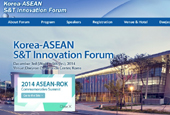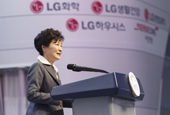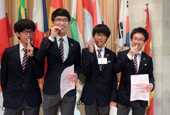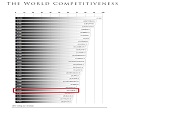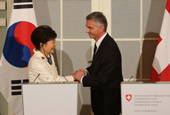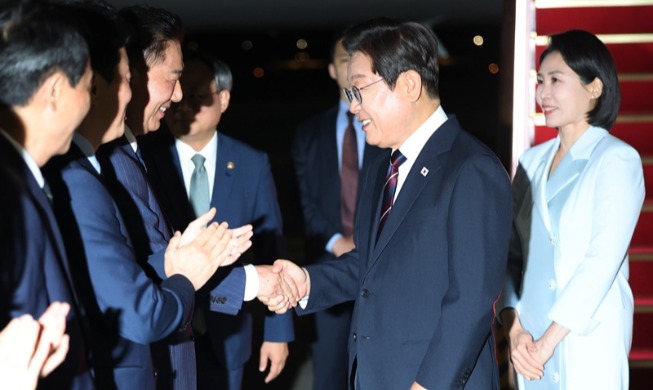The government intends to concentrate on developing core industries and on creating new growth engines for the country's future prosperity.
The Ministry of Science, ICT and Future Planning (MSIP) announced on January 15 that it would focus on nurturing the Internet of Things (IoT), big data and cloud computing industries, with the goals of boosting competitiveness, improving information and communications technology (ICT) and creating new markets. The ministry's announcement was made at Cheong Wa Dae during a briefing on its specific objectives related to the government's three-year plan to promote innovation and to grow the economy.
During the briefing, President Park Geun-hye said, "Many startups fail to pass the so called 'death valley' stage when they commercialize their ideas. The government needs to concentrate more on its efforts to solve the difficulties experienced by startups, such as raising capital when entering new markets and developing sales channels."
"It is important to preemptively secure source technologies in such promising areas as biotechnology, nanotechnology and in responding to climate change so that we can create industries and jobs. Developing new technologies takes a lot of time and money and the risk of failure is very high. Thus, the government needs to preemptively invest in those areas."
The ministry intends to increase the number of its "Creative Vitamin 2.0" programs from 57 to 90 this year. These are comprehensive, pan-government joint projects that pursue pilot trials, conduct R&D and train and publicize achievements. It will also raise the number of "smart factories," which are designed to integrate the entire creation processes, covering product design, manufacturing and distribution. Its aim is to increase from 1,000 such factories in 2015 to 4,000 in 2017, and onward to 10,000 by 2020.
By 2017, the ministry plans to invest KRW 240 billion into developing core components and in upgrading major industries. It will also help secure Korean firms' competitiveness in next-generation products, including smart cars and environmentally friendly liquefied natural gas (LNG) ships.
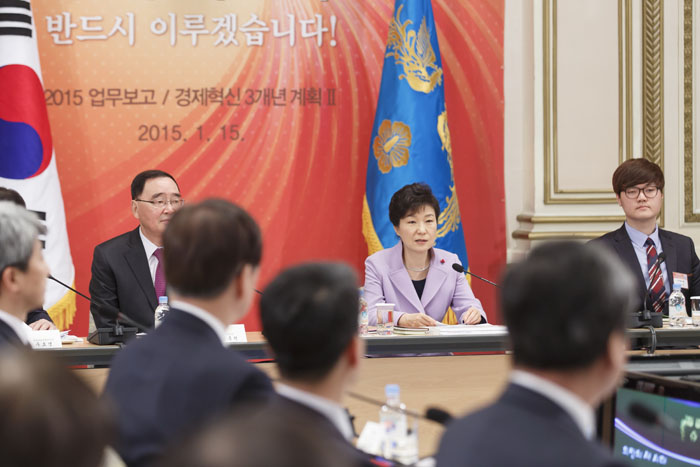
In a bid to improve companies' competitiveness in ICT and to create new industries and markets, the ministry intends to invest another KRW 704 billion in R&D this year. It will also introduce a fast-track system to reduce the amount of time needed to go from R&D planning through to financial assistance from one year to three months. It will help develop 5G technologies to commercialize a system by 2020 and increase the penetration rate of giga-speed internet from 40 percent this year to 90 percent in 2017.
The ministry will build IoT research complexes to nurture new software-based industries, covering the IoT, big data and cloud computing. It also plans to nurture global software companies and digital content companies, and introduce a system in June to examine whether public corporations infringe on the private sector software market.
In order to secure the future biotechnology market, the ministry intends to invest KRW 560 billion this year. It will help develop stem cell and DNA treatment technologies and medical equipment, and expand its support for technological development for potential new services, such as the early diagnosis of dementia. In order to reduce the amount of time required to conduct clinical trials of new medicines, it will operate technology verification platforms at six hospitals and designate personnel to deal with the Ministry of Food and Drug Safety. It will also train investors specialized in biotechnology companies in order to promote related production and exports, and provide market information about 37 target nations.
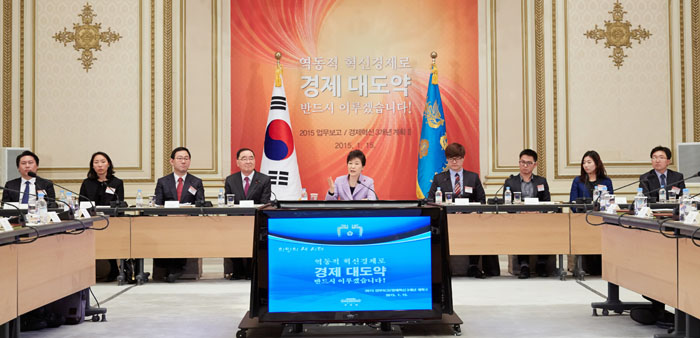
The government plans to invest KRW 1 trillion this year in R&D to secure green technology and energy markets, including the reduction of greenhouse gases. It will also help develop industry models in the solar cell and fuel cell industries to achieve KRW 216 trillion in sales by 2020 in both the energy-saving and clean energy industries.
The ministry will strengthen its support for developing nanotechnology, which will become a common base technology across many industries. It will also help develop technologies for the disaster response and safety industries. To help the country become a nanotechnology power, the government said it would help develop component- and censor-related technologies and commercialize advanced source technologies.
The ministry plans to create a "mid- to long-term technology development investment road map" to increase the effectiveness of its plans and to help promote innovation across the national R&D sector. It will also connect the public and the private sector in conducting R&D and assign roles for the two sectors. Finally, it will create a window in which 40 R&D institutions can provide technologies to the private sector.
By Limb Jae-un
Korea.net Staff Writer
Photos: Cheong Wa Dae
jun2@korea.kr
The Ministry of Science, ICT and Future Planning (MSIP) announced on January 15 that it would focus on nurturing the Internet of Things (IoT), big data and cloud computing industries, with the goals of boosting competitiveness, improving information and communications technology (ICT) and creating new markets. The ministry's announcement was made at Cheong Wa Dae during a briefing on its specific objectives related to the government's three-year plan to promote innovation and to grow the economy.
During the briefing, President Park Geun-hye said, "Many startups fail to pass the so called 'death valley' stage when they commercialize their ideas. The government needs to concentrate more on its efforts to solve the difficulties experienced by startups, such as raising capital when entering new markets and developing sales channels."
"It is important to preemptively secure source technologies in such promising areas as biotechnology, nanotechnology and in responding to climate change so that we can create industries and jobs. Developing new technologies takes a lot of time and money and the risk of failure is very high. Thus, the government needs to preemptively invest in those areas."
The ministry intends to increase the number of its "Creative Vitamin 2.0" programs from 57 to 90 this year. These are comprehensive, pan-government joint projects that pursue pilot trials, conduct R&D and train and publicize achievements. It will also raise the number of "smart factories," which are designed to integrate the entire creation processes, covering product design, manufacturing and distribution. Its aim is to increase from 1,000 such factories in 2015 to 4,000 in 2017, and onward to 10,000 by 2020.
By 2017, the ministry plans to invest KRW 240 billion into developing core components and in upgrading major industries. It will also help secure Korean firms' competitiveness in next-generation products, including smart cars and environmentally friendly liquefied natural gas (LNG) ships.

President Park Geun-hye (middle) makes her opening remarks during a briefing on the government's three-year plan to promote innovation and economic growth, at Cheong Wa Dae on January 15.
In a bid to improve companies' competitiveness in ICT and to create new industries and markets, the ministry intends to invest another KRW 704 billion in R&D this year. It will also introduce a fast-track system to reduce the amount of time needed to go from R&D planning through to financial assistance from one year to three months. It will help develop 5G technologies to commercialize a system by 2020 and increase the penetration rate of giga-speed internet from 40 percent this year to 90 percent in 2017.
The ministry will build IoT research complexes to nurture new software-based industries, covering the IoT, big data and cloud computing. It also plans to nurture global software companies and digital content companies, and introduce a system in June to examine whether public corporations infringe on the private sector software market.
In order to secure the future biotechnology market, the ministry intends to invest KRW 560 billion this year. It will help develop stem cell and DNA treatment technologies and medical equipment, and expand its support for technological development for potential new services, such as the early diagnosis of dementia. In order to reduce the amount of time required to conduct clinical trials of new medicines, it will operate technology verification platforms at six hospitals and designate personnel to deal with the Ministry of Food and Drug Safety. It will also train investors specialized in biotechnology companies in order to promote related production and exports, and provide market information about 37 target nations.

President Park Geun-hye says the government needs to make preemptive investments to develop source technologies in promising areas, such as biotechnology, nanotechnology and in responding to climate change.
The government plans to invest KRW 1 trillion this year in R&D to secure green technology and energy markets, including the reduction of greenhouse gases. It will also help develop industry models in the solar cell and fuel cell industries to achieve KRW 216 trillion in sales by 2020 in both the energy-saving and clean energy industries.
The ministry will strengthen its support for developing nanotechnology, which will become a common base technology across many industries. It will also help develop technologies for the disaster response and safety industries. To help the country become a nanotechnology power, the government said it would help develop component- and censor-related technologies and commercialize advanced source technologies.
The ministry plans to create a "mid- to long-term technology development investment road map" to increase the effectiveness of its plans and to help promote innovation across the national R&D sector. It will also connect the public and the private sector in conducting R&D and assign roles for the two sectors. Finally, it will create a window in which 40 R&D institutions can provide technologies to the private sector.
By Limb Jae-un
Korea.net Staff Writer
Photos: Cheong Wa Dae
jun2@korea.kr
Related Contents
Most popular
- Military discharge sets stage for reunion of all 7 BTS members
- 'We are back!' BTS Festa heralds hyped return of K-pop phenom
- Presidents Lee, Trump discuss tariff deal in first phone talks
- 'Maybe Happy Ending' wins 6 Tonys including Best Musical
- President Lee leaves for G7 Summit in Canada on first int'l trip

